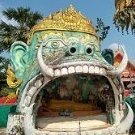Israel-Palestinian conflict: building barriers
-
Recently Browsing 0 members
- No registered users viewing this page.
-
Topics
-
-
Popular Contributors
-
-
Latest posts...
-
8
Germany wants to be Europe’s military power.
I think it will be fine.....as long as we don't mention the war. -
1
Report Champion Rooster Sold for A Staggering 6.5M Baht
Don't you just love that they just deal in cash. -
71
Bank account frozen
Bottom line is that if you didn't open the account with a qualifying visa then the bank will require you to update your visa details. Did you visit your bank and show passport on receiving the 12 month extension, they would need a copy of your extension? This has been in place since 2014 but been generally ignored by banks but recently stricter houskeeping has been put in place. This statement appeared in the recent Baan Thai newsletter. "To qualify, you’ll need to hold a long-term visa including Non-O, Non-B, LTR or Privilege. The Bank of Thailand does not permit banks to open accounts for DTV visa holders at this time. For Non-O retirement or marriage visas, this will require your e filing for a 90-day visa overseas (best from your home country before arriving) and the using the 90-day visa to open your Thai account into which you can then wire the required funds to obtain a one-year extension. " -
63
Virologist network reaffirms support for mRNA vaccine platform
Step daughters having miscarriages? Why only step daughters? Seems a very strange thing to say. -
376
My view today.
Who the **** would put a thumbs down on that???????????????????????? -
10
All Thais to be required to file taxes from 2027
A different site has a story about this and states that "Citizens wishing to receive welfare benefits will need to submit a tax return. If their income exceeds the threshold, they will pay taxes; if it falls below, they will receive welfare support." I guess Thais that don't want welfare do not have to file a tax return. https://www.nationthailand.com/business/economy/40054024
-
-
Popular in The Pub




.thumb.jpg.bc523c85a8d558dbc282dca7a2e602c9.jpg)






Recommended Posts
Create an account or sign in to comment
You need to be a member in order to leave a comment
Create an account
Sign up for a new account in our community. It's easy!
Register a new accountSign in
Already have an account? Sign in here.
Sign In Now